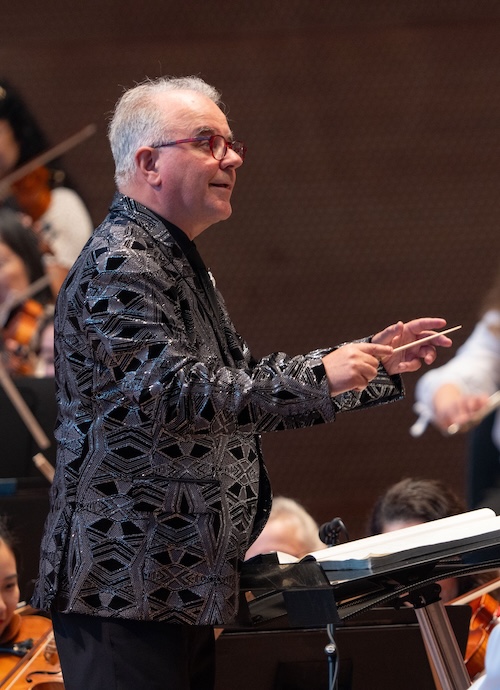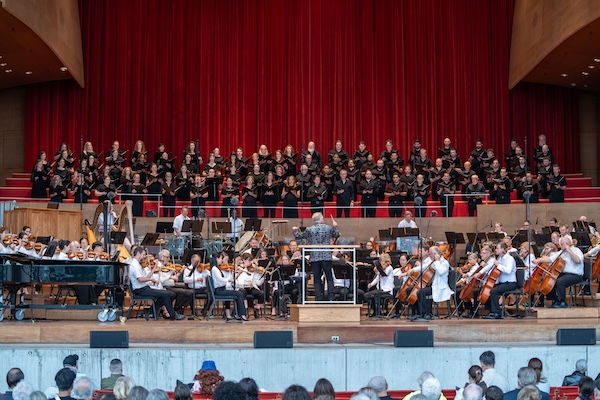Bell, Grant Park forces take a satisfying journey from Earth to the cosmos

For many local devotees of the Grant Park Music Festival, the real symphonic action begins the first weekend of the summer series. That’s when the programming often kicks into a higher gear, striking a more adventuresome balance between popular classics and unfamiliar music. It’s a winning formula that has long set the city’s lakefront lineup apart from the competition.
So it was again on Friday at the Jay Pritzker Pavilion in Millennium Park, where Christopher Bell conducted his first concert of the season with the Grant Park Orchestra and Chorus. Threats of early-evening rain never materialized and his thoughtfully conceived program took place in cool temperatures and relatively quiet conditions marred only by a couple of hot rods revving on adjacent avenues.
Bell, whose laudable tenure as Grant Park Chorus director goes back to 2002, devoted the first half to Earth-themed works of the 20th and 21st centuries for chorus and orchestra.
The centerpiece was the first festival performance of Rockford-born, Minneapolis-based composer Jake Runestad’s Earth Symphony (2021). Following intermission, he widened the cosmic lens still further to take in a logical companion piece to the Runestad—Gustav Holst’s greatest hit, The Planets. All three works found orchestra and chorus in good form, and the electronic sound enhancement was unobtrusive.
Launching Bell’s planetary excursion was Lili Boulanger’s setting (1916) of Psalm 24, The Earth is the Lord’s, sung in an uncredited English translation. Boulanger was the younger sister of the great French musical pedagogue Nadia Boulanger, and the former’s tragic early death, at 24, was a grievous loss to music of the last century. Her five-minute psalm setting made a rousing curtain raiser, its modal choral inflections and martial trumpets powerfully proclaiming God’s dominion over the Earth.

Runestad’s five-movement choral symphony, with text by Todd Boss, won an Emmy award in 2022 and has since won an honorable niche for itself among ecologically-minded contemporary classical works. The chorus is the voice of Mother Earth, imagining humankind’s power to both exalt and destroy natural abundance. Themes of ecological shame, responsibility, despoilment, lamentation and rebirth inspire now-stirring, now serene choral lines anchored by colorfully cinematic orchestral writing.
The beating heart of the piece is the penultimate Lament, an affecting elaboration of Dido’s farewell from Henry Purcell’s Dido and Aeneas, venturing off into post-romantic harmonic reaches never dreamt of in the great English baroque composer’s philosophy.
Before that, there is an antique evocation of the Greek myth of Icarus’ (literal) rise and fall that employs Near Eastern-style instrumentation and rhythms. The peaceful final pages, depicting a post-apocalyptic landscape ripe for renewal (shades of the conclusion of Wagner’s Ring cycle), bring Earth Symphony satisfyingly full circle.
Runestad’s big-boned, thoroughly effective choral writing felt like it was made to order for the massed voices of Bell’s sterling chorus and they rose to its lofty challenges like the seasoned pros they are—ditto the shipshape orchestra musicians. Too bad some of its subtle instrumental touches, notably the tuned wine glasses and bowed crotales of the final section, were largely inaudible. That said, Earth Symphony proved ideal alfresco fare—accessible without pandering, sincere and ultimately moving in its imaginative treatment of pressing existential concerns.
If Friday’s account of the Holst interplanetary travelogue wasn’t the ultimate in finely polished orchestral virtuosity, it got the job done most respectably. Bell maintained a convincing tempo for each of the seven sections, resisted the urge to pump up big extroverted movements—such as “Mars, the Bringer of War” and “Jupiter, the Bringer of Jollity”—for crass showpiece effect, and really excelled at characterizing the fleet, light-textured “Mercury, the Winged Messenger” and the riotous fantasy of “Uranus, the Magician.” The offstage women’s voices of the final section, “Neptune, the Mystic” emerged in properly ethereal balance within the symphonic texture, no mean feat in outdoor performance.
Once again the only way audience members could access Katherine Buzard’s fine program annotations was by scanning a QR code in the single-page handout, which contained texts for the choral works but little else. The festival public deserves better.
The program will be repeated 7:30 p.m. Saturday.
The Grant Park Music Festival will continue with works of Mendelssohn, Bernstein and Hailstork led by music director Giancarlo Guerrero, 6:30 p.m. Wednesday. gpmf.org
Posted in Uncategorized


